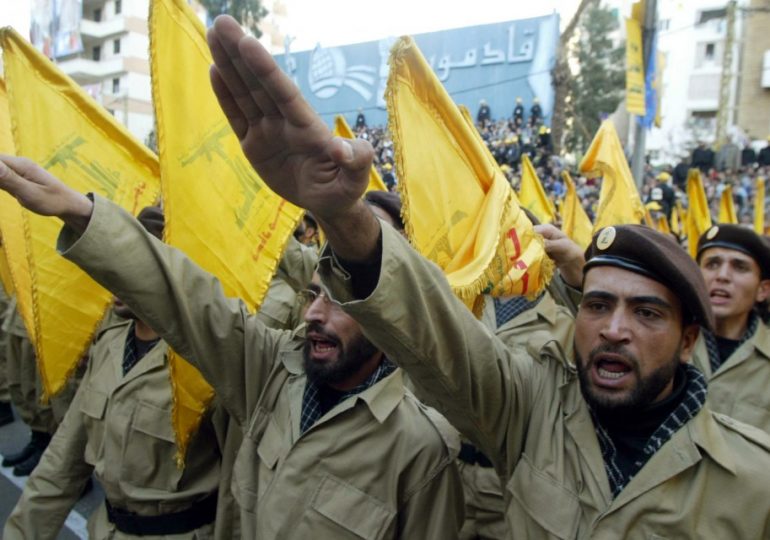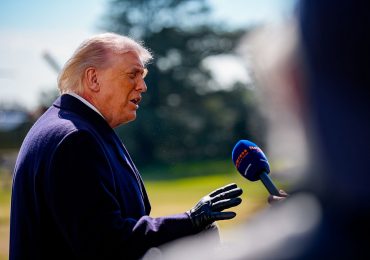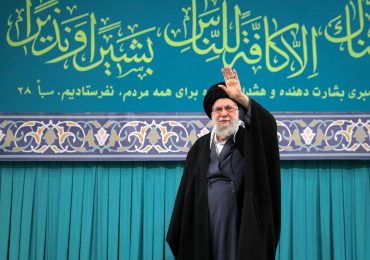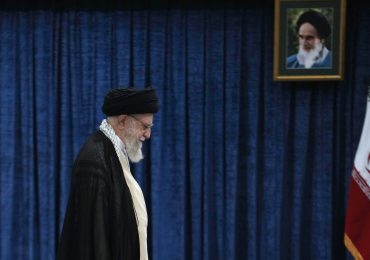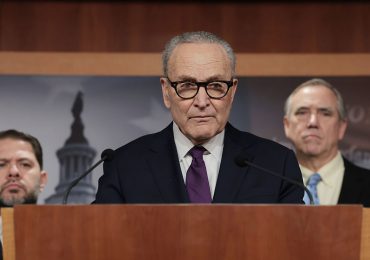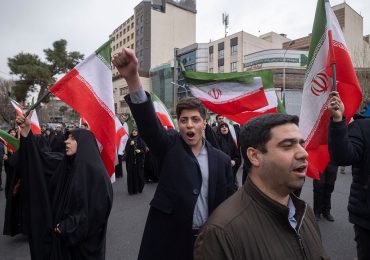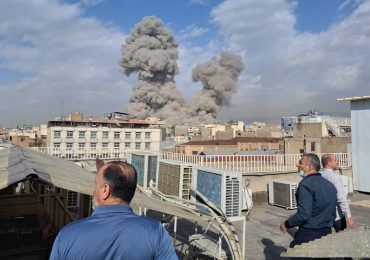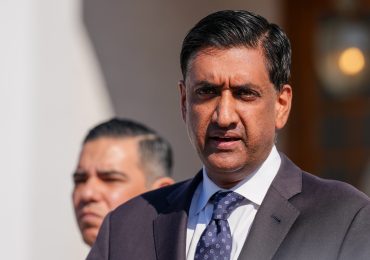MORTAL enemies Hezbollah and Israel are on the verge of open warfare, risking a deadly wider conflict in the troubled region.
After decades of bloodshed, the powerful and well-armed Islamist militia has tentacles stretching across the globe.
Militant terror group Hezbollah parade in the streets of Lebanon and have tentacles spread around the globeAFP
Yet bizarrely, as Israeli bombs rain down on its Lebanese bases and network of bunkers and tunnels, the terror group also runs its own theme park, with displays on “martyrdom” and a gift shop selling toy fighter jets made of spent bullet cases.
Dubbed “Hezbollah’s Disneyland”, it is an unsettling “attraction” in the hills of southern Lebanon, glorifying the atrocities its owners commit.
Illustrating Hezbollah’s reach, the group is believed to be behind a 1992 suicide bombing at the Israeli Embassy in Argentina, as well as the 1987 kidnap and torture of British mediator Sir Terry Waite in its Lebanese fiefdom.
Yet its propaganda-laden museum, officially called The Tourist Landmark Of The Resistance, lets day-trippers visit guerilla bunkers and clamber on Israeli tanks, leading to its nickname.
Since it opened in 2010, more than a million people have visited the park, built around tunnels once used by Hezbollah fighters, in a concept known as “jihadi tourism”.
For those who want to contribute to the paramilitary coffers, there is a souvenir shop which sells tat including wrist watches bearing Hezbollah leader Hassan Nasrallah’s face.
On Tripadvisor, most rate the museum as “excellent”. One visitor from Ireland described a day out there as “very interesting” in a review, adding: “Big car park with little funfair next door with ziplines.”
‘Secret dirty war’
Yet the park’s proprietors are declared a terror outfit by the UK, US and most Gulf Arab states.
With Iran’s ayatollah as its puppet master, Hezbollah says it has 100,000 fanatical fighters at its call.
Analysts estimate it has as many as 500,000 rockets and missiles trained on Israel.
The world is holding its breath to see if the current blood-letting will ignite a huge regional conflict.
So how did Hezbollah become a “ghost state” with a more powerful military than many countries?
In 1982, Israel invaded its northern neighbour Lebanon to root out the Palestine Liberation Organization, which was at the time using the nation as an attack base.
In bloody fighting, Israel occupied the south of the country and Shia Muslim militias took up arms against the invaders.
Fighters from the Lebanese militant group Hezbollah are funded by backers in IranAP
Seeing an opportunity to extend its influence, Iran provided funding and training to the group which became known as Hezbollah — meaning Party Of God.
Hell-bent on destroying Israel, it was soon wreaking havoc.
In 1983, it launched a suicide bombing of barracks in the Lebanese capital Beirut, housing US and French troops, leaving more than 300 dead.
The same year, another Hezbollah terrorist drove a van packed with explosives into the compound of the US Embassy in Beirut, killing 63.
The terror group — which is also a political party providing education and health care — developed a taste for kidnapping, too.
Among those seized were British journalist John McCarthy and Belfast-born lecturer Brian Keenan.
Sir Terry Waite — the Archbishop of Canterbury’s special envoy — went to Lebanon to negotiate their release, along with that of other hostages.
Sir Terry was promised he could visit the men in safety, but was double-crossed by Hezbollah associates and himself kidnapped.
Over the next five years, he was held in solitary confinement and brutally tortured.
Convinced he was a CIA plant, his captors chained him face-first to a wall for 23 hours and 50 minutes a day, allowing him just a ten-minute break for the bathroom.
Hezbollah have amassed a heavy array of artillery including rocket launchers focused on IsraelAFP
The soles of his feet were whipped and he was subjected to a mock execution.
Now 85, Cheshire-born Sir Terry recalled: “I was told I had five hours to live. They asked if I wanted anything at all. I said, ‘Yes, I would like a drink’. For the first time in my life, I felt my throat had gone dry.
“Dry from fear — not fear from death, because death will come to us all eventually — but fear as to how I would die. Would I be beheaded? Strangled? How would I die?”
Released in 1991, Sir Terry would return to Lebanon in 2012 to meet a senior Hezbollah figure, saying that the “past is the past”.
In 2000, Israel withdrew from Lebanon, with Hezbollah insisting that their hardened fighters had driven their enemy out.
WORLDWIDE CONFLICT
Meanwhile, a bloody shadow war was raging between Israel and Hezbollah that spread across the globe.
When Israeli attack helicopters gunned down Hezbollah chief Abbas al-Musawi in 1992, the Islamists sought revenge in Argentina.
The Israeli embassy in its capital, Buenos Aires, was bombed that year, killing 29.
Then, in 1994, a suicide bomber killed 85 in a Jewish community centre in the Argentine capital. Both were blamed on Hezbollah.
In 2012, the suicide bombing of a tourist bus killed five young Israelis and its driver in Bulgaria.
Hezbollah are a formidable force. They’re very well equipped. They’ve got more tunnels than Hamas had.
Military expert Professor Michael Clarke
Again, Hezbollah was implicated. Its military and intelligence prowess has seen it locked in a secret dirty war with Israel’s Mossad.
Perhaps the Israeli agency’s most audacious operation was when it fitted Hezbollah pagers and walkie- talkies with explosives and detonated them simultaneously this month, killing dozens.
In 2006, a full-blown war was triggered by a deadly cross-border raid by Hezbollah.
It was supposed to be a pushover for Israel’s well-trained regular armed forces against a guerilla army.
Hezbollah fighters stand next to the coffin of late senior Hezbollah commander Fuad Shukr, killed in an Israeli strikeEPA
But as the Israeli tanks rolled into Lebanon, it soon became clear to myself and other journalists watching from a vantage point on the Israel side of the border that they were meeting firm resistance.
Hezbollah had tunnelled deep into Lebanon’s craggy hillsides and built well- fortified positions amid its towns and villages.
Rather than the ragtag irregulars the Israelis expected, they faced highly trained and well-armed troops with night-vision goggles and sophisticated communications.
‘A formidable force’
An Israeli soldier who was part of the invasion force said Hezbollah were “nothing like Hamas or the Palestinians. They are trained and highly qualified. All of us were surprised”.
After 34 days, a peace deal was brokered when the UN passed Resolution 1701, which demanded Israel leave Lebanon and Hezbollah pull its forces north of the Litani River, 18 miles from the border.
Israel complied, but Hezbollah remained in southern Lebanon in close missile range of civilians across the border.
Now, with both sides evacuating thousands from the border region, these deadly enemies are once more preparing for all-out war.
If Israel does embark on a land invasion, it will not underestimate the Islamists this time.
Military expert Professor Michael Clarke told me: “Hezbollah are a formidable force. They’re very well equipped. They’ve got more tunnels than Hamas had.
“The tunnels in Lebanon are burrowed out of rock, and hard to destroy. They have around half a million projectiles that they can fire at Israel.
“If they chose to fire off great salvos of these things, a thousand or so at a time, three or four times a day, they are likely to overwhelm Israeli air defences.”
Hezbollah Museum ‘Hezbollahland’ in Mleeta,Lebanon features toy tanks and planes made from bullet and shell casesPhil Hannaford – The Sun
TERROR MUSEUM
On a 2013 trip to Beirut, I went to Hezbollah’s office to ask for an interview.
They declined, but said I was free to visit their museum.
The Tourist Landmark Of The Resistance is at Mleeta, 30 miles from the Israeli border, built around a tunnel and bunker complex used by Hezbollah fighters in the 2006 war.
On display was a Mirsad-1 drone which, a caption says, can be used for “scouting and bombing missions”.
A family with young children gawped at it as I passed.
There is also an Israeli Merkava tank with its gun barrel knotted at the park, currently shuttered as Israel pounds southern Lebanon from the skies.
Visitors can walk through a 180- metre tunnel used during the 2006 conflict to see bunkers containing beds, kitchenware, electricity generators, phones, radios and computers.
Stone steps climb up to a hillside dedicated to Hezbollah’s “martyrs”.
A child gestures as Hezbollah supporters gather to attend a ceremony to honour fighters killed in the recent conflict with IsraelReuters
My chatty and smiling guide was Manchester United fan Ahmed Mansour, who insisted the theme park IS suitable for children.
“They can take in the history,” he explained. “Schools visit. Hezbollah didn’t start any war. They defend their land and people. It’s not jihad, it’s resistance.
“The idea of the museum is to feel how much the Hezbollah volunteers suffered and sacrificed.”
Such was the museum’s success that Hezbollah opened another in Beqaa Valley, its stronghold in north eastern Lebanon.
Called the Museum of Jihad, its collections include British Saladin armoured cars, American M113 personnel carriers, Soviet tanks and an SA-6 anti-aircraft missile system.
Now — as Israel threatens to invade Lebanon yet again — the usable museum pieces may once more be pressed into service.
Leave a comment
